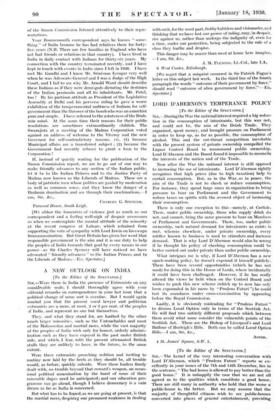LORD D'ABERNON'S TEMPERANCE POLICY
[To the Editor of the SPECTATOR.] Sin,—During the War the national interest required a big reduc- tion in the consumption of intoxicants, but this was not, and could not be, the aim of the Drink Trade. They organized, spent money, and brought pressure on Parliament in order to keep up, as far as possible, the consumption of alcohol. This and the cut-throat competition inevitable with the present system of private ownership compelled the Liquor Control Board to recommend public ownership. Lord D'Abernon and the Board found it impossible to reconcile the interests of the nation and of the Trade.
Now after the War the national interest is still opposed to increasing the use of intoxicants. Lord D'Abernon rightly recognizes that high prices (due to high taxation) help to curtail consumption. But, as in the War, so in peace, the aim of the Trade is not to check or reduce consumption. For instance, they spend large sums in organization to bring pressure to bear on Parliament and the Government to reduce taxes on spirits with the avowed object of increasing their consumption.
There is only one exception to this—namely, at Carlisle. There, under public ownership, those who supply drink do not, and cannot, bring the same pressure to bear on Members of Parliament and Governments. There, too, under public ownership, such natural demand for intoxicants as exists is met, whereas elsewhere, under private ownership, every artifice known to business is used to stimulate and increase demand. That is why Lord D'Abernon would also be wrong if he thought his policy of checking consumption could be better carried out under private than under public ownership.
What intrigues me is why, if Lord D'Abernon has a new epoch-making policy, he doesn't expound it himself publicly. There have been several opportunities (which he has not used) for doing this in the House of Lords, where incidentally it could have been challenged. However, if he has really altered the views he held when on the Control Board and wishes to push this new scheme (which up to now has only been expounded in his name by "Prudens Futuri") he could test its soundness under cross-examination by appearing before the Royal Commission.
Lastly, it is obviously misleading for "Pruden Futuri " to discuss Local Option only in terms of the Scottish Act. He will find two entirely different proposals which between them avoid what some consider the vulnerable points of the Scottish Act. These are the Bishop of Liverpool's and Lord Balfour of Burleigh's Bills. Both can be called Local Option Bills.—I am, Sir, &c.,






































 Previous page
Previous page